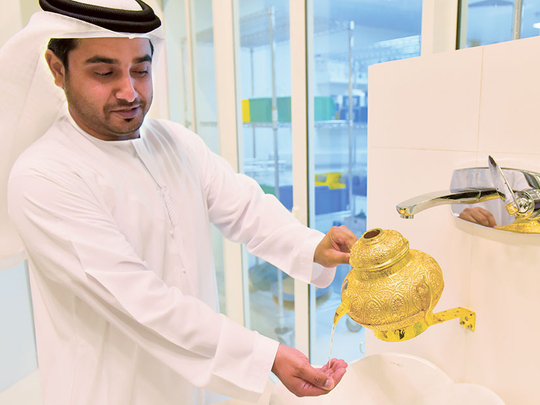
Abu Dhabi: At least 25 to 30 litres of water is used per person in mosques across the UAE when performing ablutions, an Emirati professor told Gulf News.
Dr Ahmad Al Jaberi, Assistant Professor, Mechanical and Materials Engineering Department, Masdar Institute, has responded to the problem by building his own device specifically designed to help reduce the amount of water used at mosques.
“In Islam, we are taught that there is a limit on how much water a person should use when carrying out the ablutions, and that volume of water is specified as 600ml. So we developed a device that is handmade and crafted here in the UAE. On the device, we put a line that marks the 600ml point,” Al Jaber said.
“Once the water reaches 600ml, it’s meant to trigger the subconscious of the worshipper, and make them stop there in line with the teachings of Islam,” he added.
However, the device itself can take in at least 1.5 litres of water. The reason this additional capacity was built into the device, said Al Jaber, is because he wanted the individual to be given the option of how much water they can use though he believes it would be good if worshippers adhered to the water limit.
“I could have just limited it to 600ml,” he said, “but people might react negatively. In the end, it’s important for the person to change their habits on their own. However, even if they use 1.5 litres of water, it’s still much less when you compare it to 25 litres of water being used at one go,” he said.
Installing the device inside mosques is a simple task, said Al Jaber. “All that’s required are four screws that attach the device to the wall below the tap. The mosque doesn’t need to undergo major infrastructure changes. There is no need to break the walls or install new electrical wiring. Just four screws and a handyman [is all it takes to get the device fixed],” said Al Jaber.
A second prototype is already under development. “The second device will have controls and smart systems that will give information on a number of things like how much water has been used, etc. We’re also thinking of having the device maintain the water at a certain temperature because sometimes the water at the mosque is either too cold or too hot.”
Al Jaber said that there must be continual innovation to help tackle modern-day issues faced by the UAE, and these challenges must be met by the contributions of other Emiratis.
“This land was a desert, a barren landscape and yet people lived in it and flourished, so there is a wealth of knowledge to be gained from those experiences. I always encourage young Emirati innovators to go and talk with their grandparents, and ask them what they used to do to adjust to the harsh living conditions in the past. Their job is to take that information and use it to enhance the experience of living in modern times.”












